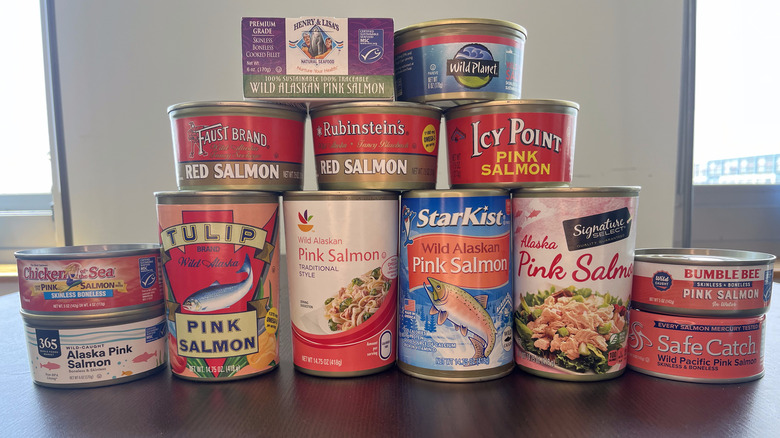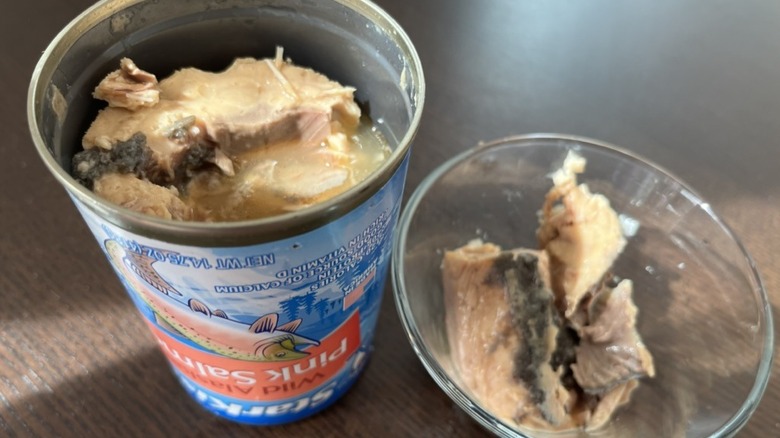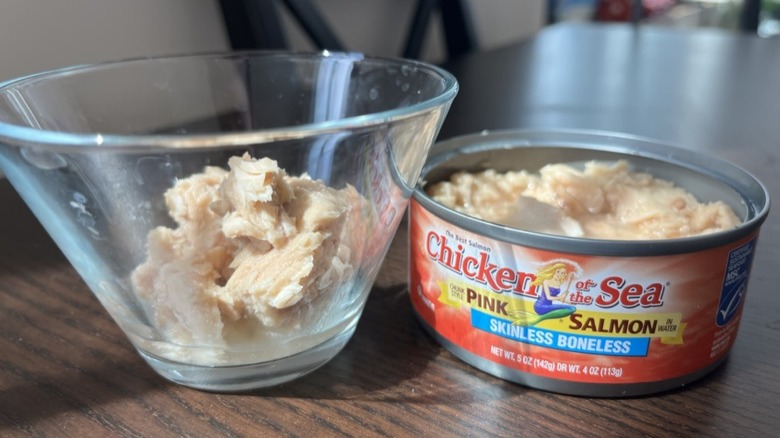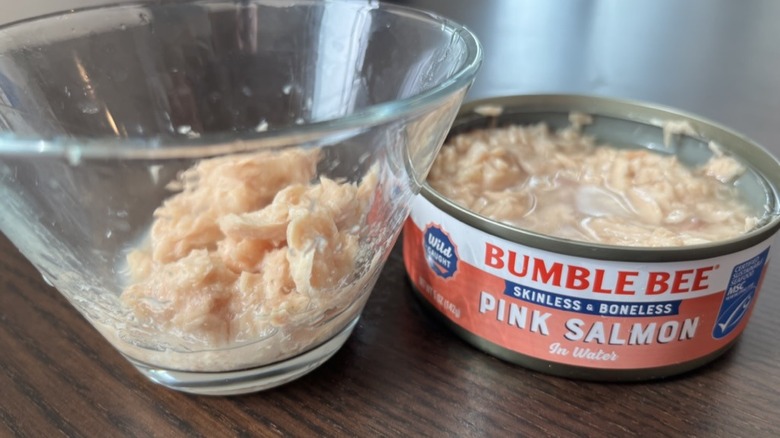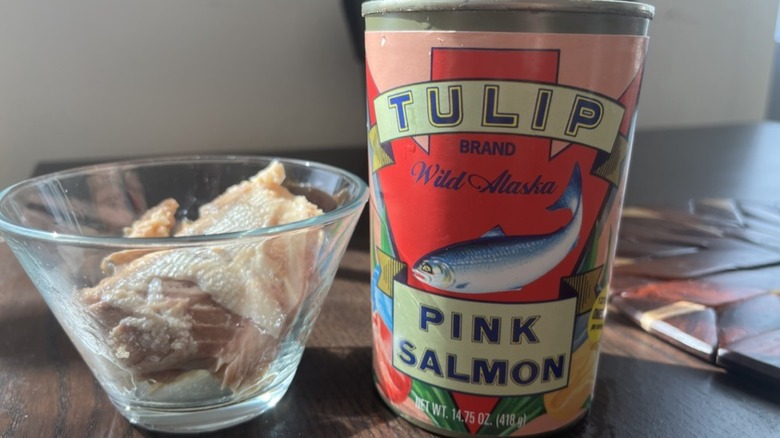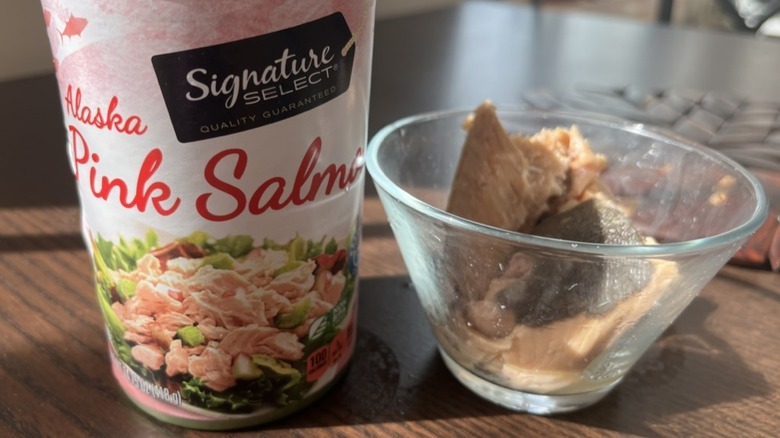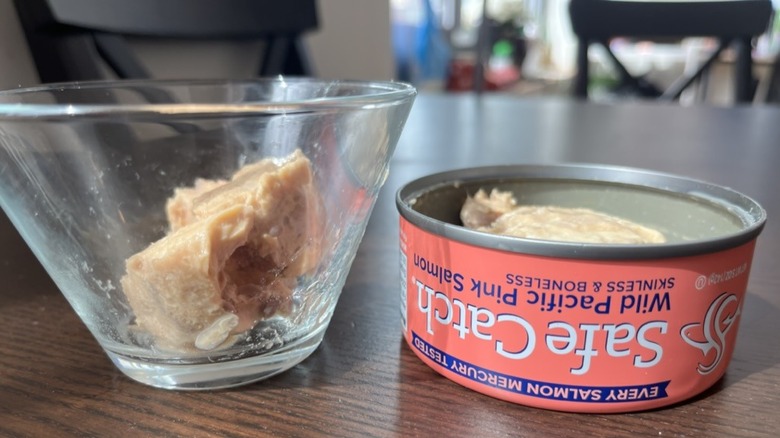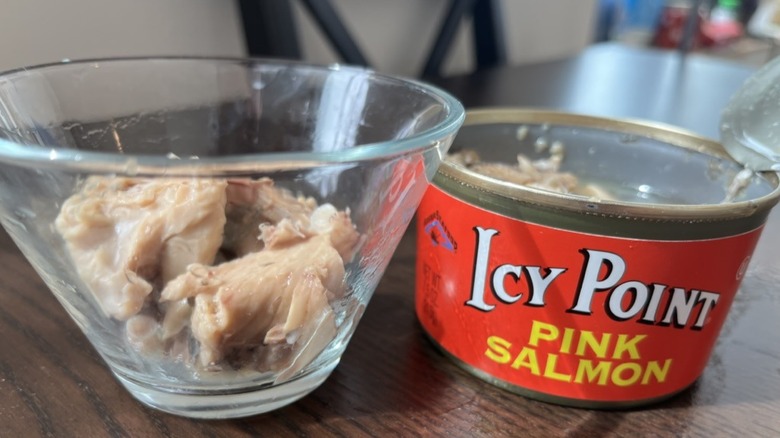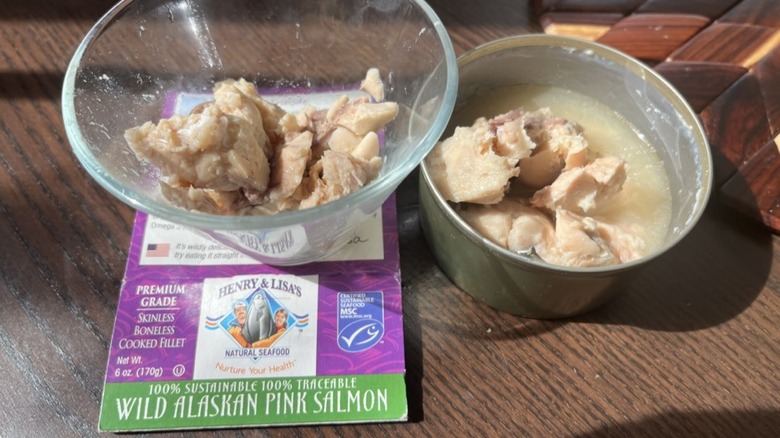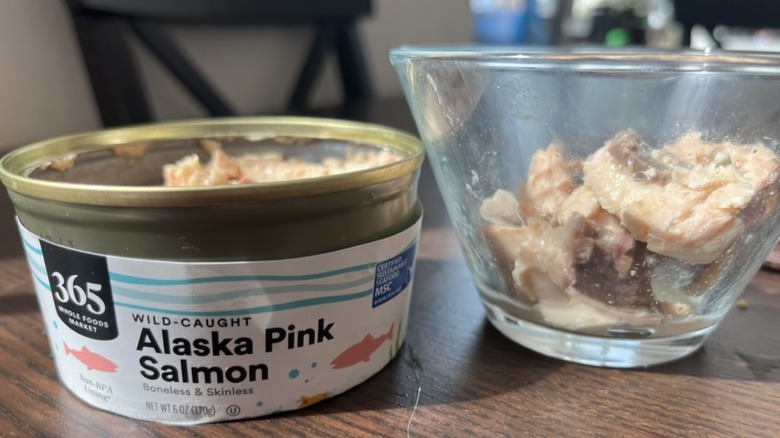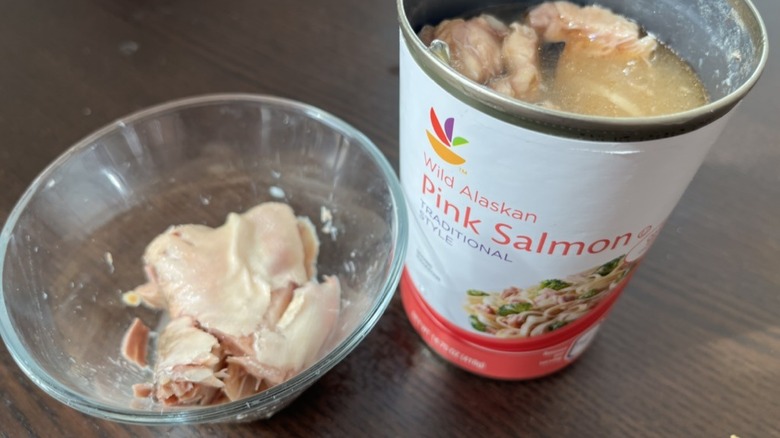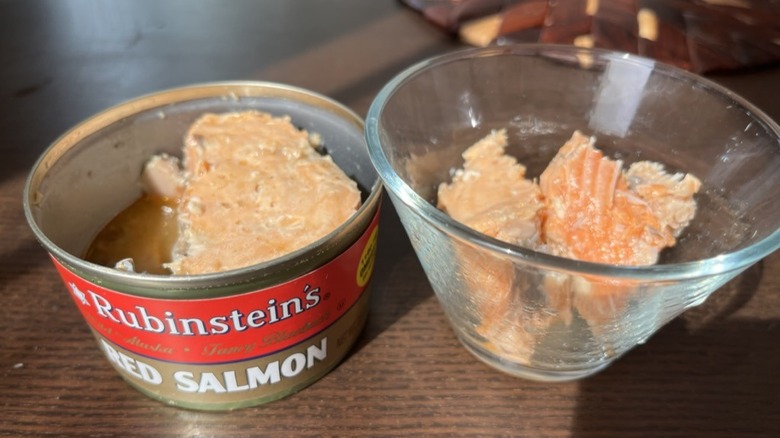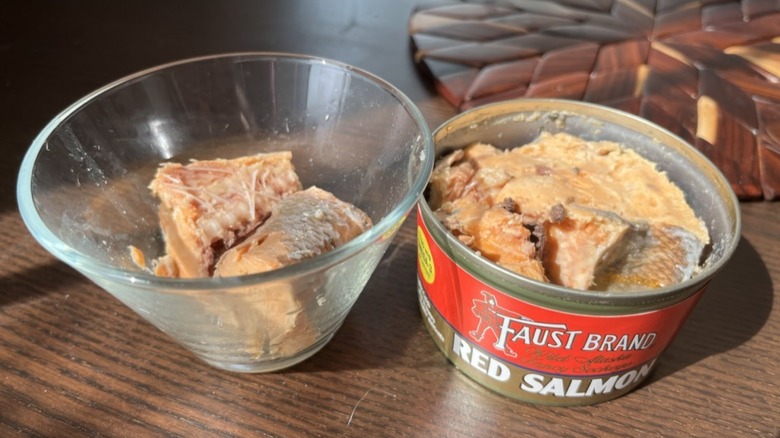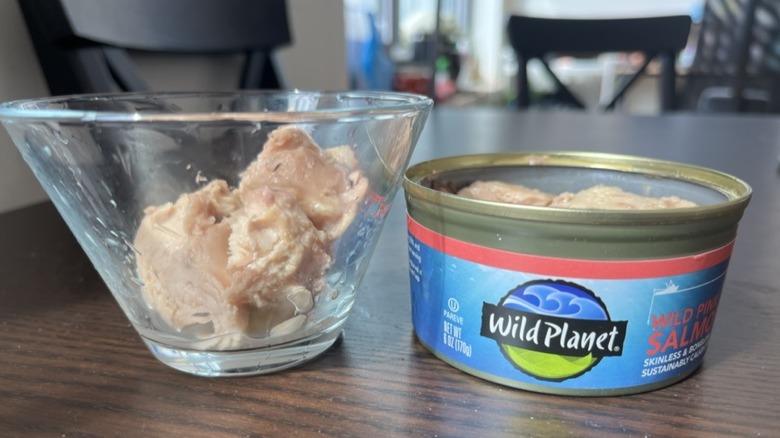13 Canned Salmon Brands, Ranked Worst To Best
We may receive a commission on purchases made from links.
Canned salmon is one of the best foods to stock your pantry. Rich in protein and omega-3 fatty acids, it's a surprisingly versatile ingredient; something you can keep on hand and use quickly when needed in sandwiches, salads, pasta sauces, casseroles, and many other dishes for a boost of nutrients and flavor. There are plenty of reasons why you should always have canned salmon on hand.
But not every canned salmon brand is alike, and there are many factors to consider when choosing the right one for your recipe. Browsing your local grocery store, you may encounter a variety of canned salmon options that vary in price, flavor, and quality. Salmon companies can also vary widely in how sustainable and environmentally conscious their practices are. While 70% of the global salmon market consists of farmed fish, other companies rely on wild-caught salmon, and there are pros and cons for each that may influence your buying decisions. Here's everything you need to know about 12 different brands of canned salmon, from the skippable to the essential.
13. Starkist
One of the biggest names in the world of canned fish, Starkist is an American company now owned by Korean corporation Dongwon Industries. They're best known for tuna (including their tuna mascot, Charlie), and were the first company to introduce pouches with a single serving of tuna. Starkist's company website notes that their products are processed in multiple different countries from wild-caught fish. Many canned seafood companies, including some that describe their product as "sustainable," outsource canning and processing to cut production costs, resulting in a less-fresh overall product that also comes with an increased carbon footprint due to the extra transport required.
This can has a uniquely tapered shape and contains a lot of water, as noted in some customer reviews. The salmon has skin and bones and comes out in one large piece, not quite as soft as some others on the list. The flavor is very salty, and this was one of the few brands on the list that left a lingering metallic "canned" aftertaste. This combined with the price ($5.69 for a 14-ounce can) makes it the lowest entry in the list.
12. Chicken of the Sea
Another of the best-known canned seafood brands, Chicken of the Sea offers several varieties of canned salmon, including a low-sodium option and another that includes bones and skin; the skinless and boneless pink salmon were what we sampled here. Purchased at $2.54, it's the most affordable option on the list, but it's not your best choice in terms of quality.
With a grainy texture, Chicken of the Sea is very soggy, and its color is more gray than pink. The scent of salmon is stronger than the flavor, and there's not really much here to differentiate it from the brand's well-known canned tuna. One Amazon reviewer noted they could clearly smell and taste tuna alongside the salmon in this can. It might do if you're really in a bind, but this brand isn't going to be a good choice for recipes that need a strong salmon flavor to shine through.
11. Bumblebee
Bumblebee is another major, well-known canned fish brand with a history that goes all the way back to 1899. Although Bumblebee is well-known for its tuna today, the company was originally founded to process salmon and still produces many salmon products, including this skinless and boneless pink salmon, purchased at $3.09. On the Seafood Stewardship Index, which ranks the world's top 30 seafood companies on their contribution to the UN's Sustainable Development Goals, Bumblebee comes in at No. 16, indicating the company is making an effort to mitigate its environmental impact with some key areas that have room for improvement.
The texture of this salmon was soft, pulpy, and watery, with a briny taste. Though overall better than Chicken of the Sea, Bumblebee is not one of the more highly-recommended brands, but no matter what brand of salmon you have access to, there are still lots of ways to use canned seafood in your kitchen. Try blending it into a sauce or the filling for a quiche or pastry.
10. Tulip
The Tulip brand is one of several on this list owned by parent company Trident, which is the largest seafood company in the U.S.; like many other major companies mentioned in this list, some of their production and manufacturing is outsourced to other countries. Tulip brand canned tuna is described on the Trident website as being "packed from fresh, prime-quality fish caught in the clear, cold marine waters of Alaska." The wild salmon fisheries of Alaska are some of the best-regulated and most sustainable in the world, and are generally considered a good place of origin for salmon as far as sustainability goes.
Tulip salmon comes out of the can in large, soft pieces with both skin and bones. It has a soft, mushy texture, which seems to be typical of many brands that package their salmon in larger pieces like this. More greasy than some other brands, Tulip is also extremely salty, with 270 milligrams of sodium in each ¼ cup serving. Overall, it's neither one of the best nor the worst.
9. Signature Select
The Signature Select brand is one of many owned by Albertsons Companies, Inc., which also includes Safeway and many other familiar U.S. brand names. Advertised as Alaska pink salmon, this product was highly ranked in customer reviews on Safeway's website, several of which mentioned this brand as a favorite for making salmon cakes. However, consumers should be cautious when purchasing any canned foods that do not advertise being free of bisphenol A, or BPA. This chemical, which is used in plastics, is found in the inner plastic lining of some cans and can leach into the food in the cans, potentially causing health problems.
At only $4.59 for a 14.75-ounce can, Signature Select is a better value than the similar-sized can of Starkist, although the Signature Select salmon was very soft, watery, and mushy. Containing both skin and bones, it has a strong fishy flavor, and would probably be better suited in a recipe with little seasoning or mild ingredients so it doesn't become too overpowering. It's hard to beat in terms of affordability, but there are better options on the list for quality.
8. Safe Catch
Safe Catch advertises its low mercury content as a major selling point. It claims to have the lowest mercury limit of any salmon brand and to be the only brand that tests each and every salmon's mercury levels. The company's commitment to a low mercury content was inspired by the founder's own experience caring for his mother, who developed mercury poisoning after consistently eating tuna. While the U.S. Food and Drug Administration advises that two or three servings per week are generally safe, mercury-rich salmon should be avoided by children and by women who are pregnant or nursing.
Purchased at $5.99, SafeCatch is more expensive than many of the options on this list. The fish comes out of the can in one piece with a lot of liquid, and the packaging requires it to be opened upside-down. SafeCatch's commitment to their high standard of safety for their products is commendable, but they're not the most-flavorful product on the list.
7. Icy Point
IcyPoint is a brand owned by parent company Ocean Beauty Seafoods. A large seafood distribution corporation with several other brands and seven distribution centers nationwide, Ocean Beauty was first established in Seattle and derives its seafood from Alaskan fishing waters. Monterey Bay Aquarium's Seafood Watch, which ranks various kinds of seafood according to their sustainability and impact on the environment, states that U.S. Pacific wild-caught salmon is generally a sustainable choice as long as it does not come from a few specific areas. Atlantic salmon, on the other hand, has been overfished to the point of it no longer being permitted commercially, so all Atlantic salmon sold in the U.S. is farmed.
This salmon was more fishy-tasting than some others. The fish comes out of the can in large pieces, but they fall apart quite easily, which is convenient. This salmon does have both bones and skin, and a Walmart review complained of too many large bones in a can of IcyPoint.
6. Henry & Lisa's
Sold at Whole Foods Market as well as other stores, Henry & Lisa's is also known as EcoFish. It is a relatively young company, launched in 1999, with the specific goal of promoting sustainable aquaculture and fishing. Henry & Lisa's proudly advertises its lack of GMO products and sources fish from places rated as sustainable by their Seafood Advisory Board and certifiers, including both wild fisheries and fish farms. Nutritionists generally advise farmed fish as being less healthy than wild-caught for a number of reasons, including the fact that farmed fish are more likely to spread disease and be contaminated with chemicals potentially harmful to people. Fish farming also creates specific environmental issues, but some commercial producers argue that it can be practiced in a sustainable way, leaving the final decision up to the consumer.
The distinctive paper-wrapped can and packaging set Henry & Lisa's apart from others on the list, and so does the price point. This was the most expensive brand sampled, purchased at $6.99 for a six-ounce can. However, the salmon itself is middle-of-the-road in terms of flavor and saltiness, similar in appearance to Safe Catch. Henry & Lisa's is advertised as boneless, though the can sampled for this article contained a few bones.
5. 365
365 is the Whole Foods Market store brand, so naturally this product can be found in-store at Whole Foods locations or ordered online. While the 365 salmon sampled here was Alaskan wild-caught, like many of the brands on this list, it should be noted that this brand also sells Atlantic farm-raised salmon products. While touted as a sustainable solution to overfishing by seafood companies, taking the pressure of human demand off wild fish populations, fish farming can also cause problems and interference with those same wild populations. When salmon escape from farms into the wild, they spread disease to wild fish and interbreed with them, passing on traits that negatively impact their wild offspring's chances of survival. Salmon shoppers concerned about the longevity of wild salmon populations may wish to consider companies that do not participate in salmon farming.
365's pink salmon is one of the pinkest brands on the list, but in terms of texture and flavor, it's right in the middle. Its strong points include the fact that it's not salty, and the can seems to be more stuffed full of meat than some other brands without too much water. At $4.39, this was also middling in terms of price for a six-ounce can of salmon.
4. Ahold (Stop & Shop)
This salmon comes to us from Ahold Delhaize, a large food and drink corporation that owns several well-known U.S. grocery store chains, including Stop & Shop, Fresh Direct, and Hannaford. Thus, this brand can be found as a generic or store brand in multiple stores, as well as online. This is another company that does sell farmed Atlantic salmon products in addition to Wild Alaskan salmon products.
The first thing one notices upon opening it is that it's greasier than many of the other canned salmon choices on this list. Fairly salty, Ahold's salmon features larger pieces of fish with bones and skin, but the texture is so soft that the salmon falls apart very easily. This was the fattiest and richest-tasting of the brands sampled. Depending on how you plan to use the salmon, that might be a plus; it might be too much for a light salmon salad but could blend irresistibly into a creamy or cheesy pasta sauce.
3. Rubinstein's
Despite appearances, Rubinstein's has no artificial coloring added; its more orangey color comes from its being a red salmon, rather than a pink salmon. Also called sockeye salmon, red salmon belong to a different species than pink salmon and have a stronger, richer flavor. Like pink salmon, they are commonly fished wild from the Pacific rather than farmed in the Atlantic. Red salmon tends to be more expensive than pink and is less commonly found as a canned salmon overall.
Purchased at $4.48 for a 7.5-ounce can, Rubinstein's has a rich flavor and a firm texture with a more solid chew than many canned salmon brands, which we absolutely love. It would do well in a recipe that required larger flakes or chunks of salmon. It's also one of the saltier brands on the list and would not require much salt added to it. Rubinstein's is kosher-certified and owned by the parent company Trident, which also owns Tulip, as well as the very similarly-packaged Faust Brand.
2. Faust Brand
Except for a human mascot, Faust's packaging is very similar to Rubinstein's, which is owned by the same parent company (Trident). Purchased at $6.09, it was a bit more expensive than Rubinstein's, but both are fatty, salted red salmon, with a similar solid texture. Individual pieces of fish with skin and bones were more clearly visible in the Faust's Brand salmon, but otherwise, this and Rubinstein's are pretty much the same.
Red salmon is said to be the most flavorful type of salmon you can buy, making either Faust's or Rubinstein's a great choice for a variety of culinary purposes. Red salmon has additional health benefits as well: these fish get their brilliant color from the plankton they eat, and this diet also makes them rich in a variety of nutrients, such as antioxidants and vitamin B12, which they have in a higher concentration than any other type of salmon.
1. Wild Planet
At $4.39 for a six-ounce can, Wild Planet was one of the most expensive brands sampled, but its commitment to sustainable fishing practices and superior product makes it worth the price. This brand is vocal about its use of pole and line fishing methods that target specific species. These methods of fishing are less-disruptive to ocean ecosystems than net fishing, which can result in the death of many sea creatures that are picked up by accident along with the desired fish. Wild Planet's website also lets us know that they obtain their salmon from smaller companies and fishing families in Alaska and Western Canada.
Wild Planet has a fresh, briny ocean scent. The fish is in fairly large and solid chunks that show the natural grains and gray fat deposits in the meat, which we appreciate. It's much less watery than some other brands, and the flavor is almost like that of fresh salmon. Good enough to eat by itself, spread on crackers or bread, or mixed into your favorite salmon-based recipe, this is canned salmon at its best.
